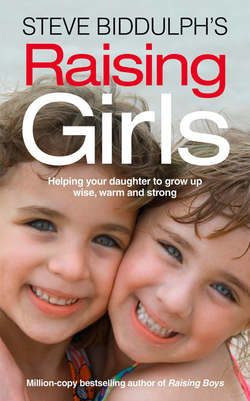Читать книгу Steve Biddulph’s Raising Girls - Steve Biddulph, Steve Biddulph - Страница 49
MATILDA LEARNS NOT TO BE FEARFUL
Оглавление(This story was told to me by my psychotherapy teacher, Bob Goulding, at the Western Institute in the 1980s. Bob was the grandfather in the story. He was a wonderful man.)
Two-year-old Matilda was enjoying playing around the swimming pool, carefully watched by her mum and grandparents. She would play happily in the toddler pool, but from time to time she would wander across to the deeper pool for a closer look. Suddenly, she simply stepped from the edge and completely disappeared into the deep water. Her grandfather, fortunately wearing some old shorts, jumped straight after her. He grabbed Matilda immediately and pulled her out. Matilda, still utterly surprised, screwed up her face and was clearly about to start wailing. But before that could happen, her granddad did an interesting thing. Holding her at arm’s length, he shouted ‘Wow! Matilda swims! What a great swimmer she is! You are great!’ while laughing and looking very pleased. Matilda seemed to hesitate, look at him for a puzzled moment – he was hard to ignore – then she did a remarkable thing. She simply changed her face to a big smile, and joined in the laughter.
Her mum came and took over, carrying Matilda back into the water and played with her, anchoring the experience into a positive one.
Would this turn Matilda into a risk taker? We don’t think so, it was scary enough to have taken that sudden plunge, but it would have taught her that adventures can be taken on the chin, and it’s better to laugh than cry. In her brain the pathways towards quick recovery and resilience were beginning to be put in place.
If we didn’t have pool fences, it might make sense to terrify kids about water. (Aboriginal parenting traditionally involved terrifying children about monsters that lurked beyond the firelight at nighttime, because it was important they didn’t stray. In my Yorkshire childhood we were half-laughingly warned about the Bogey Man.) Helping our daughters to see life as an adventure and to be confident in their own skills and judgement is important because it means they can live a larger life. These will be the girls who scuba dive, volunteer for Médecins Sans Frontières, learn to pilot a plane, or play gypsy violin in an indie rock band. Although, I am trying to talk you into this!
If Matilda’s mum or dad had freaked out, started yelling and carrying on, after Matilda’s unexpected dip, this little girl would have added to her own already considerable startle that the parental message was that water is scary. She may well have become phobic of water and swimming itself as a result. ‘Hell’s bells’, she thinks, ‘even Mum and Dad are terrified!’
The direct teaching that her grandfather offered – ‘look here, this is fun!’ – can be applied to many things in life, and from a very early age. We can help our daughters to be comfortable with animals, nature, climbing, books and libraries, sporting exertions, people, the night sky, the ocean, the list goes on. And they will carry this love of the world into their lives forever. Whenever you show her a new experience, you can add some enthusiasm, some ‘Hey look – isn’t this great?’, so that she also takes in a positive message.
Be sensible about it, but see if you can extend your daughter’s boundaries every chance you get.
